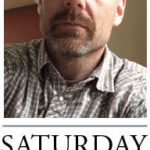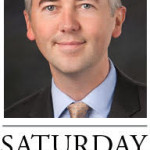Creep. Weirdo.
 I can’t remember ever knowing who I am or believing I belong.
I can’t remember ever knowing who I am or believing I belong.
Moving story, bro, but what’s your point? A lot of people occasionally wonder who they are. We all sometimes feel out of place.
Right. But I mean I have no idea who I am. I mean I have never (literally not ever) felt like I belong among other humans. Oh, and sometimes when I’m trying to figure out that stuff I feel like part of me was from Duluth — from this place — long before I started living here. That’s pretty weird.
I come from people who lived in Duluth for a while and loved it and contributed to it and died and are buried in dirt here. My maternal great-grandpa, George Beck, was Duluth Central principal for about 30 years, then helped found WDSE-TV. Mom grew up in McGregor and often came over on the train to visit him and great-grandma (Leila) Beck. Mom got a Duluth Business University degree and worked at the air base for a while. Dad graduated from UMD in 1970, the same year I was conceived at 927 West Fifth Street. Great-grandma died in ’81; Great-grandpa went in ’91; their bodies are at Forest Hill Cemetery.
When my mind was forming itself, Mom and Dad brought my younger brother and I here a few times. They also told us a lot of stories about this place: Mom’s tempting, terrifying girlhood dream about diving into the canal; Dad and some college buddies — they’d gone to watch a storm — helping authorities haul up the body of a diver who died trying to rescue two doomed boys from currents between the canal’s piers; Mom going downtown for movies and snacks and shopping with her grandma, and gazing over The Lake from Central’s clock tower with her grandpa; Dad’s UMD professors (some stuffy, some hip) and roommates (rowdy); and on and on.
I started at UMD in fall 1989. When I got here I recognized many parts of campus from a childhood of frequently and intensely poring over black-and-white words and photos in Dad’s senior-year annual. That yearbook’s content, style, and presence are still powerful proportions of the material my brain uses to define and experience Duluth. Before I visited campus for the first time in fall 1988, I honestly expected it to smell and feel like the yearbook’s 18-year-old heavy, glossy paper and ink and binding glue and soul. Part of me occasionally still does.
Based on how I was shaped by those people and stories and sepia-toned notions, it makes sense I’d have developed a sense of connection with Duluth before ever living here.
But when I say I feel like I might have been from here before I got here, I don’t mean to say I feel like I knew enough about the city to have built a strong familiarity with and connection to it before I lived in it. I mean to say that in addition to feeling terrified and excited when I arrived for college, I inexplicably felt like I’d come home. I have always felt more at home here than I’ve felt anywhere else, even when among people here I feel lonesome and out of place. I mean to say I sometimes feel like something elemental in or about me has been from this place since long before this city existed. Maybe of this place is more precise than from this place. Maybe not. Probably not. Pretty sure I’m trying to think and write far above my intellect.
Very little of what I’m trying to say makes any sense. Most of what I’m trying to say makes no sense. I’m not an indigenous person. I’m indigenous to nowhere. I have no indigenous knowledge or blood memory or traditions or identity. I’ve heard I come from people who were Dutch, French, Sicilian, Scottish, Irish, and a few other Euro variations. I’m a worst-case-scenario upper-Midwestern white boy swaddled in ideas about race and gender that benefit me at the expense of human beings I’m different from. That’s my culture. I’m from Grand Rapids, MN/Huntington, IN/Rochester, MN/Duluth, MN, and I’ve lived in Duluth far longer than in any of those other places, so I’ve probably just been here long enough, and done a poor enough job of exploring other places, that my privileged brain is making up some stories because it doesn’t have to help me figure out how to survive. Who am I to say I’m from anywhere? Ugh: white people.
I frequently feel compelled to confess and discuss stuff like this publicly. It’s a manifestation of what my football-bro brain has been doing since junior high, when too much time with Dad’s Simon and Garfunkel records started me on a lifetime of insufferable attempts at being perceived as interesting. As deep. As a sensitive guy who’s got some really meaningful stuff to say. My maudlin, melancholy-is-so-cool, angsty-affected phase has being going strong for about 30 years now. Maybe that’s why I still think I’m baffled by who I am and where I belong. Maybe I actually know those things or know they don’t matter. I don’t know. I do know I spend a lot of time trying to make sense of my identity, and other than brief daily moments when listening to music gives me unexpected respite — when it helps me be without brooding on being — something about how I experience Duluth comes closer than anything ever has to helping me believe I might fit somewhere. Might belong.
(You should know this before deciding to continue: nothing gets resolved by the end. Duh. What resolution can come of nonsense?)
Among most groups of people, especially folks it seems I’m supposed to feel camaraderie with, I pretty much always just feel stupidly awkward and out of place. I’m not sure how often it shows. Maybe I hide it well sometimes. I usually feel like it’s radiating from my every intonation, facial expression, bit of body language, and pore. Those feelings could mean I’m actually different from folks I’m grouped with. They could also be evidence of my lingering adolescent tendency to challenge convention in ways that wind up excluding myself, provoking animosity toward me and ostracization of me, and coming across as foolish if not reckless. P.L. Thomas (one of my favorite radical education writers) says, “The critical are destined always to be outsiders; it is our lot not to fit in, not to play along.” I do try to be critical like that. Not critical like, “Your favorite band sucks” (although I used to be that guy), but critical like keeping my critical consciousness fully engaged ALL the time. I definitely prefer constantly asking, “But why?” to playing along, even if it complicates situations and creates discomfort.
My thinking exists on margins and boundaries so often, and has existed there so long, and seeks those places so intensely, that I can’t remember whether I chose to be there or got pushed. I don’t suppose it much matters, because now it’s where I’d rather be; the moderate, normative, supposedly reasonable center of any context feels less and less comfortable or balanced to me. “Normal” usually feels like an unspoken, arbitrary set of extremes agreed upon by dominant folks who get to decide what the norms are and how to punish folks who violate them.
I am not, I promise you, wearing a tinfoil hat or taking essay-writing breaks to post in doomsday-prepper forums.
I’ve been teaching college writing courses and some other stuff since the late ’90s. I’m in the third year of UMD’s Doctorate of Education in Teaching and Learning program, just starting a dissertation about how normalized power hierarchies within higher education — especially ones that encourage professors and other teachers to expect and enforce conformity, submission, obedience, and deference from students — reflect abuse-enabling hierarchies outside education. I think and read a lot about how to be an effective, compassionate teacher. I work very hard to be the teacher I aspire to be, which is tightly connected to being the man and the human being I aspire to be. And when I’m with other people who teach, I seldom really enjoy the sensation of talking about any of it. I think I used to, before I made a big, dumb, mannish-boy mistake about 12 years ago: I openly and confrontationally challenged an edict from above, trusting the ostensible safety of vigorous idea exchange among colleagues and superiors in higher education (HA!), and basically got fired for it. My experience and education tell me my ideas about authentic, compassionate teaching are credible and have only continued to deviate from most other teachers’ ideas during that decade-plus. I have a lot of trouble understanding conventional notions about teaching among other people who do the job, especially among folks who teach writing. I trust what I believe, because I’m constantly testing it, but I usually feel prohibitively nervous talking about it. (Instead, I keep it hush-hush by writing vaguely about it on the World Wide Web.)
I have solid reasons for believing my teaching perspective and approach are credible, but they’re different enough from what most other people seem to believe and do, and I get such weird looks and responses when I try to describe them (and I’m generally so simultaneously confident and absolutely unsure about anything I do), that I spend a lot of time either wondering why I’m so weird and annoying or trying to figure out why so many other teachers so often decide to tell themselves so many self-serving stories. I don’t buy into “Good grief, can you believe these lazy, entitled, constantly texting students today?” narratives among teachers or anyone else. I don’t agree that being a teacher has to inherently mean feeling aggrieved or harried or put upon. I don’t believe any student’s job is to do what I tell them in order to avoid disappointing me. I believe a lot of what looks like being a “good student” is actually strategic compliance, and I don’t believe teaching should ever include getting students to conform, submit, or comply. And when conversations among teachers inevitably go to those and some other common places, I often literally or figuratively go away.
I do the same thing in many interactions among men, among other people who write, among white folks, straight folks, folks from Minnesota, music nerds, guys who like riding and working on bicycles, extended-family members, or any other group where “comfortable” interaction requires conforming to and never naming or questioning prescribed perspectives that depend on aggressively avoiding critical self-reflection. Being the person who always questions, violates, or just calls attention to those expectations exhausts me (and annoys most everyone else), but if the alternative is acquiescing to obvious bullshit — and it often is — I prefer to stay tired (and annoying). If feeling like I belong means shutting off the part of my brain that notices the ethical and intellectual costs of belonging, I’ll stay lonesome, thanks.
I’ll also keep adding to a well-established series of awkward, painful attempts at connecting with people I admire by trying to express my authentic self and show them what I see of their true selves. It hasn’t gone well so far.
I should be clear about something: I’m the asshole in many of these situations. I’m the deficient one. I’ve rarely been treated with outright hostility or abuse. I’m judgmental and imperious and incredibly arrogant. Didactic. Superficial and entitled. Sometimes just stupid. Despite feeling wholly unimpressed with anything about myself, I often come across as thinking I have something figured out. I often mistreat people and fail to be curious. I’m quite far from the teacher or the man or the human being I aspire to be. I know my problems with the world are mostly problems within me.
Sometimes I wish I’d just mellow out and get comfortable identifying as part of any group. I don’t think I will. In the past, trying to belong has usually cost me more than forced or chosen exclusion has cost.
I prefer to claim no memberships. No group-based identity. No allegiance with anything tangible.
And yet as long as I’m here, I’ll always derive a definitive part of my identity from being able to say, “I live in Duluth.” I feel like I belong in this place. Not “belong” as in, “I feel accepted and comfortably situated in this city and among its people,” but as in, “For reasons I have yet to comprehend, I feel like I’m supposed to base myself at this location on the planet.” I feel a thrill and a burst of pride every time I get to claim this place. (It has very little to do with craft brewing, local music, mountain-bike trails, or other Duluth amenities I’m consciously grateful for every day.) Almost since the moment I learned Duluth exists, this is the only place I’ve wanted to be from. I still don’t know why. I don’t think it’s because of anything I talked about in those first few paragraphs. I don’t think it’s because of anything I’ve tangibly experienced while living here.
It’s more about air and light. Ether. Vapor. Ephemeral stuff.
Everything worth anything is ephemeral.
I also wish whatever drew me here and has kept me here weren’t as strong as it’s been. I’ve wasted a lot of time here I could have spent more substantively in other places. Even when I haven’t felt comfortable here, this is the place I believed I wanted to be, and experience tells me I was often wrong. I fear being similarly wrong in the future. It’s been a damaging addiction, a mindless choice that’s limited me from seeing possibility when I feel hopeless, stuck, and like a loser. That’s not this place’s fault. I doubt this is a malevolent place. It’s probably indifferent to anything I care about.
Sometimes I believe I’ve sincerely never wanted to leave — truly never wanted to live somewhere else or throw myself out of this cozy nest like I’ve watched so many other peers do permanently or intermittently since our late teens.
Critical consciousness tells me “I’ve sincerely never wanted to leave” is a seductive story that helps me avoid having to confront the foolishness or cowardice that’s kept me hanging around here while other people have gone exploring. Being honest about that beckons my distorted brain into weeks and months of dark, crushing regret about having been so few other places. I spend a lacerating amount of time envying other people for knowing how to create lives that take them away from here. I envy those people and their lives with an ugly greed. I expend a lot of energy punishing myself for squandering privilege and opportunity I could have used to gather experiences I now ache and feel naive about not having, and that I’m doubtful about being able to have in the future. I simply haven’t known how to see things that are so obvious to some people. Those people include friends and acquaintances I love and deeply admire, and who I’d like to be around more but kind of can’t bear to spend time with or look in the eye because I’m sure they’re conscious of what a dolt I am for never having been where they’ve been or done what they’ve done. Sometimes my sense of not belonging or not fitting in comes from just believing I deserve to feel defective and embarrassed.
Those feelings look so silly typed out in words, which does nothing to minimize their significant power in my head. I hope your brain never plays tricks like these on you, because I don’t want you or anyone else ever to feel the hopelessness I sometimes feel.
Sorry about that. I seem to have digressed.
To summarize: I have no idea who I am. I’ve never felt like I belong. Except when I say I’m from Duluth. Then I feel like I belong. Not sure if that abstract sense of belonging helps me figure out who I am.
Could any of that possibly mean part of me was from here before I was from here? Can stuff like that happen?
It sounds so weird.
Recommended Links:
Leave a Comment
Only registered members can post a comment , Login / Register Here














2 Comments
FranceneStarr
about 9 years agoRachael Lauren Wilson
about 9 years ago